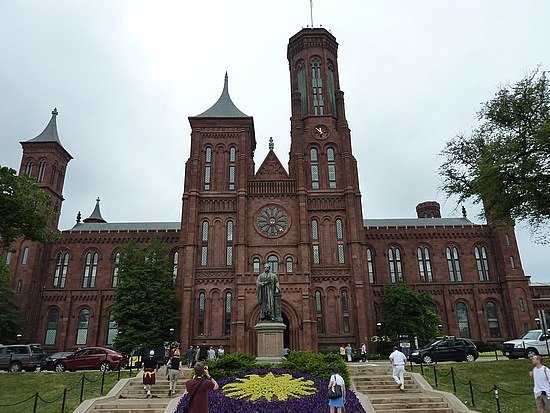Smithsonian and AFGE continue disagreement over COVID-19 safety protocols
In today's Federal Newscast, the seeming disconnect between the Smithsonian and its largest employee union continued over the weekend.
To listen to the Federal Newscast on your phone or mobile device, subscribe in PodcastOne or Apple Podcasts. The best listening experience on desktop can be found using Chrome, Firefox or Safari.
Clarification: The Smithsonian disputes Mr. Booth’s claims, saying that while the officer did visit the health unit, he was not given any covid test by the museum and told to go home and check with his healthcare provider. An agency spokesperson further stated that he died later at a hospital, where staff there informed the family he had tested positive for Covid-19.
- The seeming disconnect between the Smithsonian and its largest employee union continued over the weekend. A security officer and member of AFGE local 2463 died from a COVID infection over the weekend, according to local president Reggie Booth. The employee had been stationed at the National Museum of American History earlier last week. Booth claims in a statement that after the officer was informed of his infection by the Smithsonian health clinic, it was the sick employee and not the clinic who informed co-workers. Booth reiterated his call to Smithsonian Management to close museums until the virus is more under control.
- Federal employees violating the Ethics in Government Act will pay heftier fines in 2022. The Office of Government Ethics is increasing fines across five areas of the law by anywhere from $300 to almost $4,000 per violation. The increases are part of the annual inflation adjustment required by the Federal Civil Penalties Inflation Adjustment Act Improvements Act of 2015. The maximum fine amounts are for any violation found to have occurred after November 2, 2015, when President Obama signed the bill into law.
- The Postal Service is gearing up to deliver a billion at-home COVID-19 tests to households in the coming weeks. USPS reaches a deal with the American Postal Workers Union for its clerks to package and label parcels that contain free COVID-19 rapid tests purchased by the Biden administration. An AWPU official expects USPS will ship out about 2 million of these packages a week once the program gets up and running. Starting Wednesday, households can request up to four free tests on COVIDTests.gov. Tests are expected to ship within 7-to-12 days of ordering. (Federal News Network)
- Two members of the Joint Chiefs of Staff are working from outside the Pentagon after testing positive for COVID-19. General Mark Milley, the Joint Chiefs chairman and Gen. David Berger, the commandant of the Marine Corps are both working remotely. A spokesman says Milley has only mild symptoms. The Marine Corps says Berger’s positive test hasn’t affected his ability to work. (Federal News Network)
- The Department of Veterans Affairs is pushing back the second rollout of its Electronic Health Record because of an uptick in COVID-19 cases. The agency now expects the system will go live at its medical facility in Columbus, Ohio on April 30, instead of March 5. Melissa Bryant, VA’s deputy assistant secretary for public affairs, told reporters the EHR system is ready to operate, but says the agency is not where it needs to be with training employees. (Federal News Network)
- The Department of Veterans Affairs misused a procurement tool from the Defense Logistics Agency, and potentially lost millions of dollars as a result. The Office of Inspector General found in a new report that VA could have saved up to $4.4 million if it had checked GSA Federal Supply Schedule contracts before purchasing medical items through the Defense Logistics Agency’s Electronic Catalog, or ECAT. VA’s procurement office also failed to conduct annual reviews of its interagency agreement with DLA. The IG recommended that VA create a process for auditing and checking if acquisitions can be purchased at lower prices using different procurement tools.
- The Patent and Trademark Office wants to test out a new acquisition approach to technology. USPTO has two goals in mind as it begins to explore its new Rapid Phased Production process. First, can it develop and operate secure enterprise infrastructure operations in a timely and agile manner. And second, can it reduce the burden on itself and industry. To help figure that out, USPTO released a survey to vendors asking four broad questions. These include providing examples of scalable, resilient and flexible infrastructure operations like platform, database and integration services. Responses to the survey are due by February 9.
- The Department of Defense is telling its contracting officers to get ready to transition to a new way of keeping track of its vendors. The federal government has been using Dun & Bradstreet’s system of “DUNS numbers” to identify contractors for decades. After several years of planning, the General Services Administration has developed its own numbering scheme. It won’t take full effect until April, but DoD wants procurement officials to start the transition now to minimize technical difficulties once the time comes. (Federal News Network)
- The Texas National Guard has had some serious workforce issues in recent years, now lawmakers want an investigation. National Guard members reported untenable working and living conditions as well as unreliable paychecks while working on Texas’ border mission Operation Lone Star. The 10,000 troop mission is also seeing a high number of suicide attempts. Now 13 Texas lawmakers are asking the Texas Military Department Inspector General to take a look into the issue. The letter comes after four Texas National Guard members took their lives between October and December last year.
- The Army is changing some of its email security measures so soldiers can download and send attachments while they are outside of government networks. The previous policy left many National Guard and Reserve soldiers frustrated because they were not often on a government network. The Army says the issue is now fixed and it is focusing on expanding its bring your own device pilot. (Federal News Network)
- The government is looking for someone to lead efforts to hunt down threats on agency networks. The Cybersecurity and Infrastructure Security Agency is recruiting an associate director for threat hunting. The position is responsible for spearheading CISA’s efforts to identify, analyze, detect, and respond to significant cyber threats affecting federal civilian agencies, state and local governments, and critical infrastructure networks. The annual salary could be as high as $246,000. The 2021 National Defense Authorization Act gives CISA the authority to deploy threat hunting technologies on federal agency networks.
- The Biden administration is looking to accelerate its Software Bills of Materials initiative. Officials met with tech companies and open source software organizations last week at the White House. The meeting comes after critical vulnerabilities emerged in Log4J, a widely-used, open source software library. Participants discussed the use of SBOMs, which list software used in different products and services. The administration plans to use SBOMs in the federal procurement process as part of its strategy to improve the nation’s cybersecurity.
- Federal employees hit by tornadoes in the Midwest and South, as well as wildfires in Colorado, can now take advantage of unused annual leave donated by their peers. The Office of Personnel Management is setting up an emergency leave transfer program for feds affected by these disasters in Arkansas, Colorado, Illinois, Kentucky, Missouri and Tennessee. The program allows federal employees to donate unused annual leave to a pool. OPM unusually sets up such a program after a presidentially declared disaster.
Copyright © 2024 Federal News Network. All rights reserved. This website is not intended for users located within the European Economic Area.
Eric White is news anchor and Federal Drive producer at Federal News Network.
Follow @FEDERALNEWSCAST





